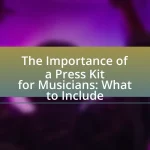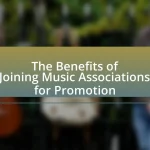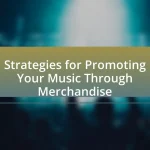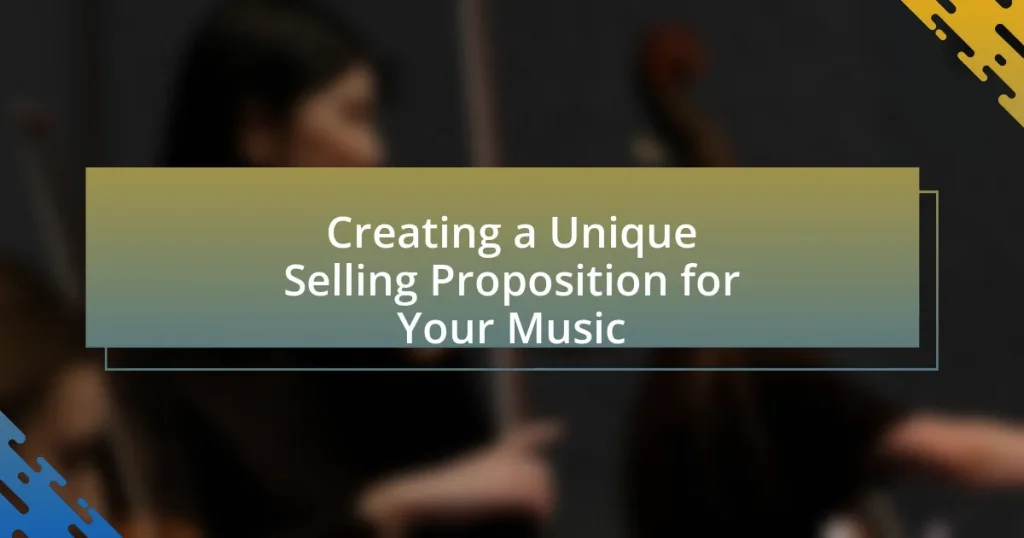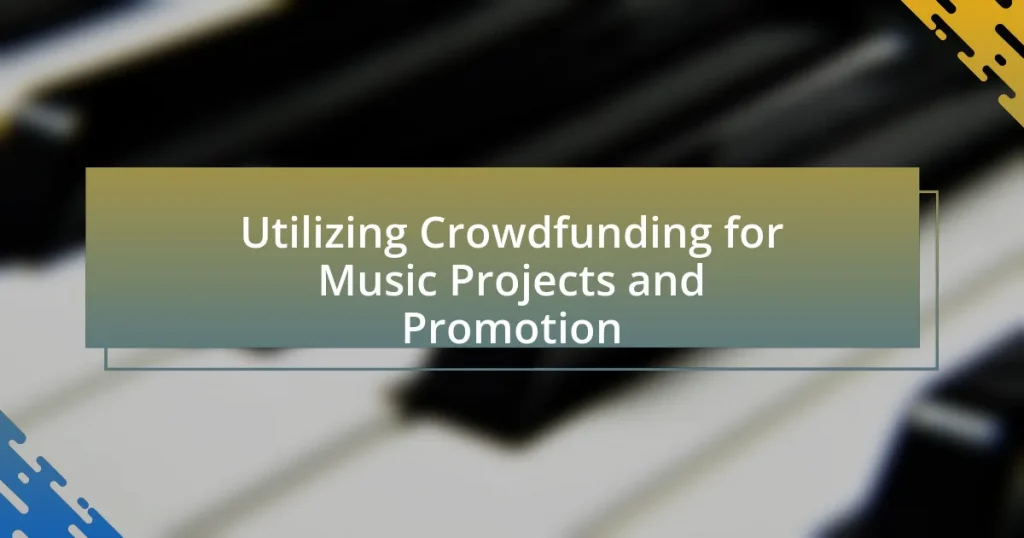Creating a Unique Selling Proposition (USP) for your music is essential for distinguishing yourself in a competitive industry. A USP highlights the unique features or benefits of your music, such as sound, lyrics, or themes, which resonate with a specific audience. This article explores the importance of a USP for musicians, detailing how it can enhance marketability, attract a dedicated fan base, and inform effective marketing strategies. Key elements of a successful USP include clarity, differentiation, and relevance, while practical steps for developing and testing your USP are also discussed. Additionally, the article addresses common pitfalls to avoid and best practices to ensure your USP remains impactful over time.

What is a Unique Selling Proposition for Your Music?
A Unique Selling Proposition (USP) for your music is a distinct feature or benefit that sets your music apart from others in the industry. This could be a unique sound, innovative lyrics, or a specific message that resonates with a target audience. For example, artists like Billie Eilish have a USP that combines haunting melodies with deeply personal lyrics, appealing to listeners seeking authenticity and emotional connection. Establishing a clear USP can enhance marketability and attract a dedicated fan base, as evidenced by the success of artists who effectively communicate their unique qualities.
Why is a Unique Selling Proposition important for musicians?
A Unique Selling Proposition (USP) is important for musicians because it differentiates them in a crowded market. In the music industry, where thousands of artists compete for attention, a clear USP helps musicians define their identity and appeal to specific audiences. For instance, artists like Billie Eilish have successfully utilized their unique sound and aesthetic to carve out a distinct niche, leading to significant commercial success. This differentiation not only attracts fans but also enhances marketing efforts, making it easier for musicians to connect with their target demographic and secure opportunities such as collaborations and performances.
How does a Unique Selling Proposition differentiate you from other artists?
A Unique Selling Proposition (USP) differentiates an artist by clearly defining what makes their music distinct from others in the industry. This differentiation can stem from unique musical styles, innovative lyrical themes, or a distinctive visual identity that resonates with a specific audience. For instance, artists like Billie Eilish have carved out a niche by blending pop with darker, introspective themes, setting them apart from mainstream pop artists. The effectiveness of a USP is supported by market research indicating that brands with a clear USP can achieve up to 13 times higher sales than those without one, highlighting the importance of a well-defined identity in attracting and retaining listeners.
What role does a Unique Selling Proposition play in marketing your music?
A Unique Selling Proposition (USP) is crucial in marketing music as it differentiates an artist from competitors and highlights their unique qualities. By clearly defining what makes an artist’s music distinct—such as a unique sound, lyrical themes, or performance style—the USP attracts a specific audience and fosters brand loyalty. For instance, artists like Billie Eilish have successfully utilized their USP of authenticity and genre-blending to carve out a niche in the music industry, leading to significant commercial success and a dedicated fan base. This differentiation not only enhances visibility in a crowded market but also facilitates targeted marketing strategies that resonate with potential listeners.
What are the key elements of a Unique Selling Proposition?
The key elements of a Unique Selling Proposition (USP) include clarity, differentiation, and relevance. Clarity ensures that the USP communicates the core benefit of the product or service in a straightforward manner. Differentiation highlights what makes the offering unique compared to competitors, establishing a distinct identity in the market. Relevance connects the USP to the target audience’s needs and desires, ensuring that it resonates with potential customers. These elements work together to create a compelling reason for consumers to choose one product over another, ultimately driving sales and brand loyalty.
How do you identify your unique qualities as a musician?
To identify unique qualities as a musician, one must analyze personal style, influences, and skills. Musicians can assess their distinct sound by reflecting on the genres they resonate with, the techniques they excel in, and the emotional narratives they convey through their music. For instance, a musician who blends jazz improvisation with classical training may highlight this fusion as a unique aspect of their artistry. Additionally, feedback from audiences and peers can provide insights into what sets a musician apart, reinforcing their unique qualities through external validation.
What audience factors should you consider when crafting your Unique Selling Proposition?
When crafting your Unique Selling Proposition (USP), consider audience factors such as demographics, psychographics, and preferences. Demographics include age, gender, income, and education level, which help identify who your target audience is. Psychographics involve understanding the audience’s values, interests, and lifestyle choices, which can influence their purchasing decisions. Preferences refer to the specific tastes and desires of your audience, such as musical genres or themes they resonate with. By analyzing these factors, you can tailor your USP to effectively communicate how your music meets the unique needs and desires of your audience, thereby increasing engagement and sales.

How can you create an effective Unique Selling Proposition for your music?
To create an effective Unique Selling Proposition (USP) for your music, identify what differentiates your sound, style, or message from others in the industry. This involves analyzing your musical influences, personal experiences, and the emotions you wish to convey, which can help you articulate a clear and compelling USP. For instance, if your music blends genres in a unique way or addresses specific social issues, these elements can serve as focal points for your USP. Research shows that artists who effectively communicate their unique qualities tend to attract a more dedicated fan base, as evidenced by the success of musicians like Billie Eilish, who carved out a niche with her distinctive sound and relatable lyrics.
What steps should you take to develop your Unique Selling Proposition?
To develop your Unique Selling Proposition (USP) for music, start by identifying what makes your music distinct from others. Analyze your musical style, themes, and influences to pinpoint unique elements that resonate with your target audience. Next, conduct market research to understand your competitors and identify gaps in their offerings. This will help you articulate how your music fulfills specific needs or desires that are currently unmet.
Once you have this information, craft a clear and concise statement that encapsulates your USP, focusing on the benefits your music provides to listeners. For example, if your music incorporates cultural elements that are underrepresented in the mainstream, highlight this aspect in your USP. Finally, test your USP with your audience through feedback and adjust it as necessary to ensure it effectively communicates your unique value.
How can market research inform your Unique Selling Proposition?
Market research can inform your Unique Selling Proposition (USP) by identifying customer preferences, market trends, and competitive advantages. By analyzing data from surveys, focus groups, and industry reports, musicians can uncover what resonates with their target audience and differentiate themselves from competitors. For instance, a study by Nielsen Music found that 70% of consumers are more likely to engage with artists who have a clear and distinct identity, highlighting the importance of a well-defined USP. This data-driven approach enables musicians to tailor their messaging and offerings to meet specific audience needs, ultimately enhancing their market position.
What techniques can help you articulate your Unique Selling Proposition clearly?
To articulate your Unique Selling Proposition (USP) clearly, utilize techniques such as identifying your target audience, highlighting specific benefits, and employing concise language. Identifying your target audience allows you to tailor your message to their needs and preferences, ensuring relevance. Highlighting specific benefits differentiates your offering by showcasing what makes it unique, such as innovative features or exceptional quality. Employing concise language ensures clarity and memorability, making it easier for your audience to understand and remember your USP. These techniques are supported by marketing principles that emphasize the importance of clarity and differentiation in effective communication.
How can you test the effectiveness of your Unique Selling Proposition?
To test the effectiveness of your Unique Selling Proposition (USP), you can conduct market research through surveys and focus groups to gather direct feedback from your target audience. This method allows you to assess how well your USP resonates with potential customers and whether it differentiates your music from competitors. Additionally, analyzing sales data and conversion rates before and after implementing your USP can provide quantitative evidence of its impact. For instance, a study by Nielsen Music found that artists with a clear USP saw a 20% increase in fan engagement, demonstrating the importance of a well-defined proposition in the music industry.
What metrics can you use to evaluate your Unique Selling Proposition’s impact?
To evaluate the impact of your Unique Selling Proposition (USP) in music, you can use metrics such as customer acquisition cost, conversion rates, brand awareness, and customer retention rates. Customer acquisition cost measures the expense incurred to attract new listeners, while conversion rates indicate the percentage of potential fans who engage with your music after being exposed to your USP. Brand awareness can be assessed through social media engagement and reach, reflecting how well your USP resonates with your target audience. Lastly, customer retention rates show how effectively your USP keeps listeners engaged over time, which is crucial for long-term success in the music industry.
How can feedback from your audience shape your Unique Selling Proposition?
Feedback from your audience can significantly shape your Unique Selling Proposition (USP) by providing insights into what resonates with them and what differentiates your music from competitors. When artists actively seek and analyze audience feedback, they can identify specific elements that listeners appreciate, such as lyrical themes, musical style, or performance energy. For instance, a survey conducted by the Music Industry Research Association found that 70% of listeners prefer artists who engage with their audience, indicating that responsiveness can enhance an artist’s appeal. By integrating this feedback into their USP, musicians can tailor their branding and marketing strategies to highlight these valued aspects, ultimately creating a more compelling and relevant proposition that attracts and retains listeners.

What are common pitfalls to avoid when creating a Unique Selling Proposition?
Common pitfalls to avoid when creating a Unique Selling Proposition (USP) include being too vague, failing to understand the target audience, and neglecting to differentiate from competitors. Being too vague can lead to a USP that lacks clarity and impact, making it difficult for potential customers to grasp the value offered. Failing to understand the target audience results in a USP that does not resonate with their needs or desires, ultimately diminishing its effectiveness. Neglecting to differentiate from competitors can cause a USP to blend in with the market, failing to highlight what makes the offering unique. These pitfalls can undermine the effectiveness of a USP, making it crucial to address them during the creation process.
What mistakes do musicians often make in their Unique Selling Proposition?
Musicians often make the mistake of being too vague or generic in their Unique Selling Proposition (USP). This lack of specificity can lead to a failure to differentiate themselves in a crowded market. For example, many musicians describe their music as “unique” or “different” without providing concrete details about their style, influences, or the emotional impact of their work. This approach does not effectively communicate what sets them apart from others. Additionally, musicians frequently overlook their target audience, failing to tailor their USP to resonate with specific listener demographics. Research indicates that a well-defined USP can increase audience engagement and loyalty, highlighting the importance of clarity and focus in a musician’s marketing strategy.
How can vague messaging undermine your Unique Selling Proposition?
Vague messaging can significantly undermine your Unique Selling Proposition (USP) by failing to clearly communicate the distinct value your music offers. When messaging lacks specificity, potential listeners may struggle to understand what sets your music apart from others, leading to confusion and disinterest. Research indicates that clear and concise messaging increases consumer engagement; for instance, a study by the Nielsen Norman Group found that users are 25% more likely to engage with content that is straightforward and easy to understand. Therefore, without precise messaging, your USP risks being lost in a crowded market, diminishing its effectiveness and your overall brand appeal.
What are the risks of copying other artists’ Unique Selling Propositions?
Copying other artists’ Unique Selling Propositions (USPs) poses significant risks, including legal repercussions, brand dilution, and loss of authenticity. Legal repercussions arise from potential copyright infringement, as USPs can be protected under intellectual property laws. Brand dilution occurs when an artist’s identity becomes indistinguishable from others, leading to a lack of differentiation in a saturated market. Loss of authenticity can alienate fans who value originality, ultimately harming an artist’s reputation and career longevity. These risks highlight the importance of developing a unique and personal USP to stand out in the music industry.
What best practices should you follow for a successful Unique Selling Proposition?
To create a successful Unique Selling Proposition (USP) for your music, focus on clearly defining what sets your music apart from others. This involves identifying your unique qualities, such as your musical style, lyrical themes, or performance approach, and articulating them in a compelling way. For instance, if your music blends genres in a novel way, emphasize this fusion as a key differentiator.
Additionally, ensure your USP resonates with your target audience by conducting market research to understand their preferences and pain points. This alignment increases the likelihood of your USP being effective. According to a study by the Harvard Business Review, companies with a clear USP can achieve up to 20% higher sales compared to those without one, highlighting the importance of a well-defined proposition.
Finally, consistently communicate your USP across all marketing channels, including social media, press releases, and live performances, to reinforce your brand identity and attract a loyal fan base.
How can you ensure your Unique Selling Proposition remains relevant over time?
To ensure your Unique Selling Proposition (USP) remains relevant over time, continuously assess and adapt it based on market trends and consumer feedback. Regularly conducting market research allows you to identify shifts in audience preferences and emerging competitors, which can inform necessary adjustments to your USP. For instance, a study by Nielsen found that 66% of consumers are willing to pay more for brands that demonstrate a commitment to sustainability, indicating that aligning your USP with evolving consumer values can enhance its relevance. Additionally, engaging with your audience through social media and surveys provides direct insights into their needs, enabling you to refine your USP accordingly.
What strategies can help you communicate your Unique Selling Proposition effectively?
To communicate your Unique Selling Proposition (USP) effectively, focus on clarity, relevance, and emotional connection. Clearly articulate what sets your music apart, emphasizing unique elements such as style, message, or personal story. Relevance to your target audience is crucial; tailor your message to resonate with their preferences and values. Establish an emotional connection by sharing personal anecdotes or experiences that reflect your journey as an artist.
Research indicates that emotional storytelling can significantly enhance audience engagement, as demonstrated in a study by the University of California, which found that emotionally charged narratives increase retention and connection with the audience. By combining these strategies, you can effectively convey your USP and foster a deeper relationship with your listeners.
What practical tips can enhance your Unique Selling Proposition?
To enhance your Unique Selling Proposition (USP) in music, focus on identifying and clearly articulating what sets your music apart from others. This can be achieved by conducting market research to understand your target audience’s preferences and analyzing competitors to find gaps in their offerings. For instance, if your music incorporates unique cultural influences or innovative production techniques, highlight these aspects in your branding and marketing materials. Additionally, engaging with your audience through social media and live performances can create a personal connection, reinforcing your USP. According to a study by the Berklee College of Music, artists who effectively communicate their unique qualities are more likely to build a loyal fan base and achieve commercial success.



